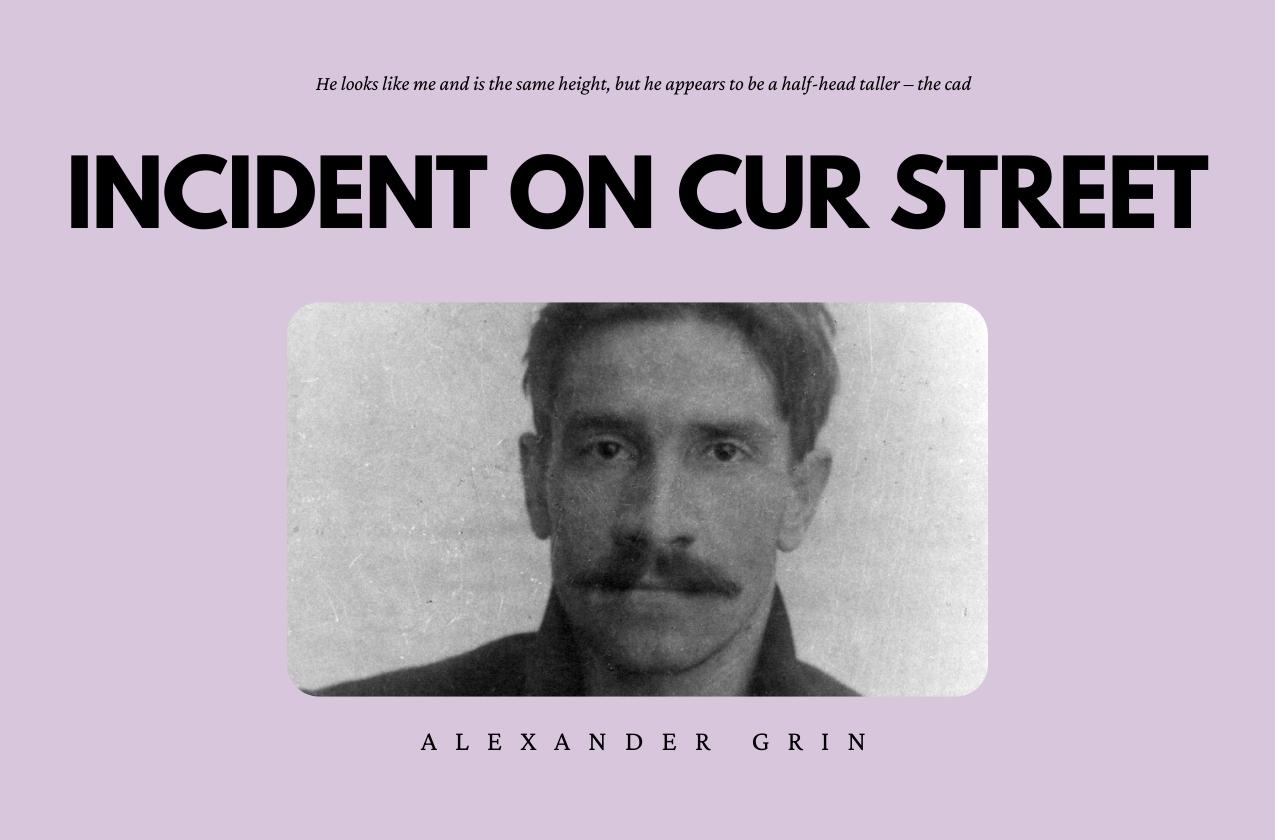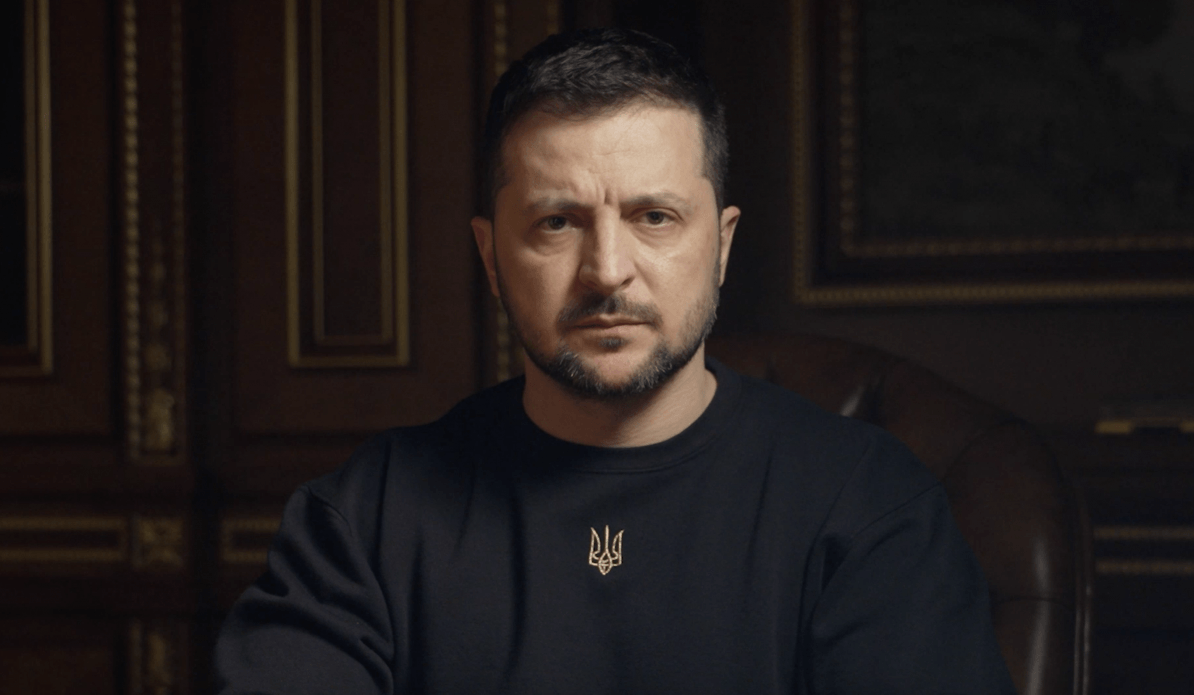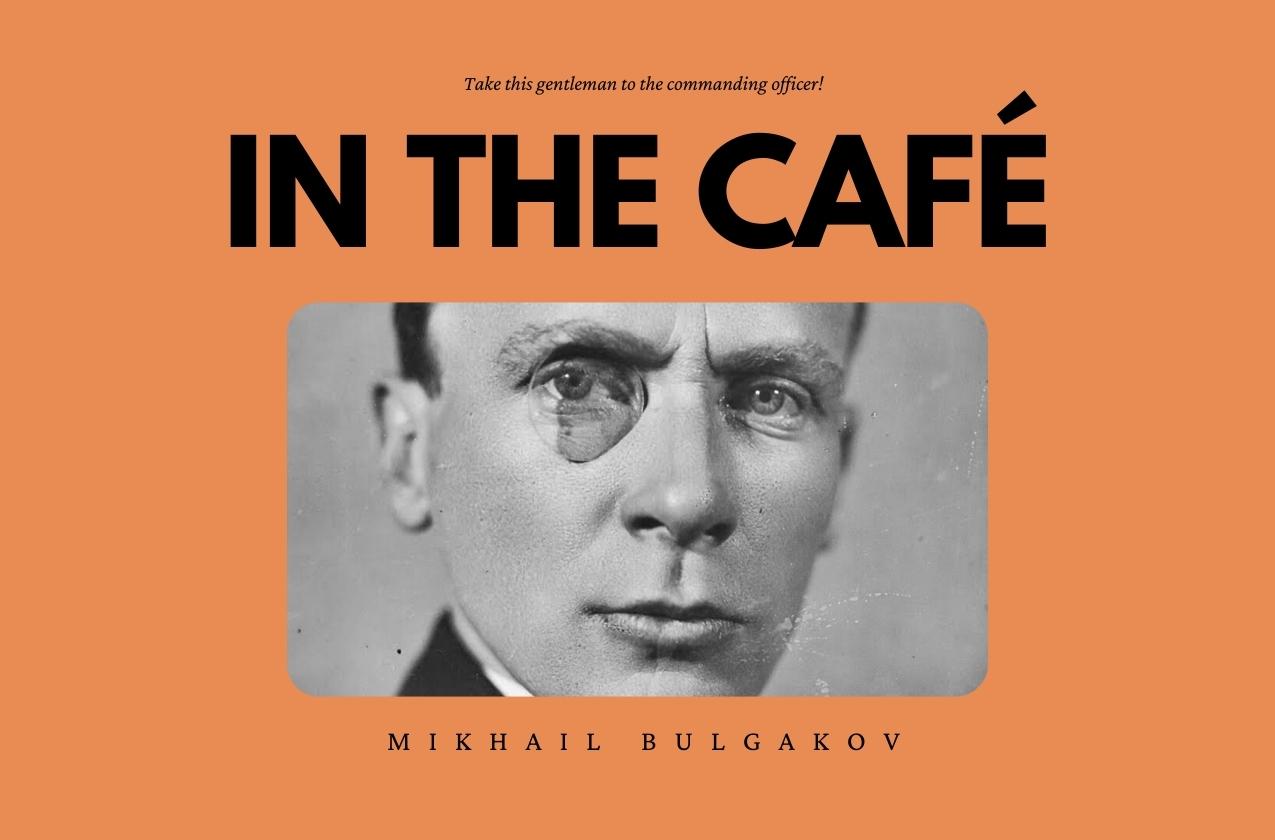Main — Culture — The Bookshelf: Incident on Cur Street
CultureThe Bookshelf: Incident on Cur Street

In 1896, 16-year-old Alexander left for Odessa with a strong decision to become a sailor. Only once was he lucky. He was taken as a sailor on the ship "Tsesarevich", which belonged to the Russian Society of Shipping and Trade in Odessa. The trip to Alexandria was the only foreign voyage in his life. A memorial plaque to Alexander Grin was opened in Odessa, near the Odessa Port Museum, on the wall of the house where the writer has lived.
He looks like me and is the same height, but he appears to be a half-head taller – the cad.
— From an old comedy
As it happened, Alexander Golts came out of the vaudeville show and arrived at the rendez-vous exactly one half-hour early. As he waited for the object of his love, he ran his eyes over every skirt mincing across the street, and impatiently tapped his cane on a wooden box. He waited in misery and passion, darkly certain of the outcome. And sometimes, smiling as he remembered the past, he thought that maybe things would work out just fine after all.
Evening fell. Cur Street, as narrow as a crevasse, was misted over with a cloud of golden dust as cooking smells wafted out of dirty windows, sending the stench of scorched food and damp laundry through the air. Green grocers and ragmen walked down the street, hoarsely shouting out their wares. From time to time slow-moving men fell out the door of the beer hall. When they came out, they first sought some support, then sighed, shoved their hats down to their noses and walked off with exaggeratedly steady steps, wavering between grim and blissful.
“Hello!”
Alexander Golts’ whole body shuddered. He turned around. She stood before him in a casual pose, as if she’d just stopped for a second and would instantly be off. Her dark, lively face with its sad look and whimsically cocked eyebrows avoided Golts’ eye. She looked at the people passing by.
“My dear!” Golts said in a tense but affectionate voice and then stopped.
She turned to face him and nonchalantly swept her eyes over his bright tie, the feather in his hat, his smoothly shaved and slightly trembling chin. He was still hoping for something; we’ll see about that.
“I…” Golts whispered something and began to chew at his lip. Then he thrust his hand into his pocket, pulled out a scrap of an advertisement and tossed it away.
“If I may…” At this, his hand touched the rim of his hat. “So it’s all over between us?”
“It’s all over,” the woman echoed. “Why did you want to see me?”
“More… for no reason,” Golts said forcefully. His head swam with grief. He stepped forward and then, to his surprise, took her thin, contemptuously obedient hand and then instantly let it go.
“Good-bye,” he said, squeezing out the word, as heavy as a mountain. “Are you leaving soon?
Now someone else was speaking for him while he listened, paralyzed by this agonizing nightmare.
“Tomorrow.”
“I’ve still got your umbrella.”
“I bought another. Good-bye.”
She slowly nodded at him and then left. The box proved to be sturdier than Golts’ cane; the fragile ivory object shattered into little pieces. He stared at the back of the girl’s head as she walked away, but she never once turned around. Then a coalman carrying a huge basket obstructed his view of her. A bit of her hat glimpsed from around the corner — and that was all.
Golts went through the doors of the nearest restaurant. Inside it was filled with noise and people; slanted rays of iridescent sunshine quivered in bottles standing like soldiers. Golts sat down at an empty table and shouted, “Garcon!”
A deferential but impersonal man in a filthy shirtfront ran up to Golts and smacked the dust off the table.
Golts ordered.
“A bottle of vodka.”
When he was given his order, he poured a glass, sipped and spit it out. Angry sparks flashed in his eyes and he snorted furiously.
“Garcon!” Golts shouted. “I didn’t order water, for God’s sake! Take away this liquid — there’s plenty in any water barrel. Bring me vodka! Make it fast!”
Everyone in the bar, even the most phlegmatic customer, jumped out of their seats and surrounded Golts. The waiter, shocked, swore that there was real vodka in the bottle. In the general turmoil as all the customers sipped a little bit of water to be sure that Golts was right, a new sealed bottle was brought to the table. The insulted and pouting owner of the café, finding himself in an uncertain and unpleasant position, removed the cork himself. He carefully poured a glass of the liquid with hands that trembled nervously. Out of pride he didn’t want to taste it, but suddenly, overcome with doubt, he sipped. He spit it out. There was water in the bottle.
Enjoying himself and quietly laughing, Golts continued to ask for vodka. There was an incredible racket. The owner, his face waxy with fear, turned from side to side as if seeking protection. Some people shouted that the restaurant owner was a crook and they ought to call the police. Others stoutly insisted that the swindler here was Golts. A few religious types thought of the devil; their little brains, terrified all their lives, refused to provide any explanation that was not connected with the All-Mighty.
Panting from heat and nerves, the owner said, “Forgive me… honest to God, I can’t imagine how this happened. I don’t know anything about it –– leave me be. Holy Mother of God! I’ve been serving it for 20 years! Twenty years!”
Golts stood up and patted the fat man on the shoulder.
“My dear man,” he announced as he put on his hat. “I have no complaints. Your bottles are most certainly made of mesh –– it’s no wonder that the alcohol evaporated. Good-bye!”
As he left he didn’t turn around, but he knew that behind him mouths were falling open in amazement.
From the moment Golts went outside, the description of the historian (whose testimony I used to write all the text above and below) strongly contradicts the testimony of the butcher. The butcher asserted that the strange young man headed to the bakery and asked for a pound of rusks. The historian, whose name I will not reveal at his request but whose face is, in any case, more respectable than the face of the butcher, swears that he began to sell eggs next to the old lady on the corner of Cur Street and Blind Man’s Lane.
This contradiction, however, does not substantially change the import of what happened, and so I will stop into the bakery. Golts opened the door, looked inside and saw a crowd. People from all walks of life, old folks, children and women pushed behind him, discretely gesturing and pointing out the strange man who had scandalized the tavern owner. They were on his heels like a pack of dogs, driven by a kind of frenzied curiosity mixed a black fear borne of ignorance. Golts frowned, shrugged and then instantly burst out laughing. Let them puzzle it out — it was his last, fantastical entertainment.
So he walked up to the counter and asked for a pound of sugar-covered rusks. The bakery filled up with customers. Everyone asked for this or that whether they needed it or not and hungrily stared at the stern, stone-faced Golts. He seemed not to notice them.
The voice of the shop assistant cut through the thick haze of tension.
“Sir, what on earth is going on?”
The weighing pan of the scale, filled to the brim with rusks, did not weigh more than the one-pound weight. The salesgirl stretched out her hand and yanked down the chain of the weight pan, but the other pan didn’t even budge.
Golts laughed and shook his head, but his laughter was the last drop in the bystanders’ cup of fear. They ran off, pushing and shrieking. Little boys stuck in the doors cried out as if they’d been stabbed. The shop assistant stood there, at a loss, florid with fear.
Golts went out again, slamming the door so hard that the glass rattled. He wanted to break something, smash something, hit the first man he saw. Stumbling, with a pale, bloated face, his hat pulled down over one ear, he looked like a lunatic. It would have been better for the old woman if he hadn’t noticed her. He took an egg from her basket, broke the shell and pulled out a gold coin. “Oh my!” the astonished woman cried out, and her cry was picked up and carried by the crowd blocking the street: “Ohhhh!”
Golts instantly stepped away and rummaged around in his pocket. What was he looking for?
The people standing around the old lady shrieked, some sputtering with laughter, others with inane curses. It was really something to see. Ancient, greedy hands frantically cracked egg after egg. Their contents flowed onto the road and coagulated into shiny patches in the dust. But there wasn’t gold in any other egg. Out of her toothless mouth came a torrent of senile cursing, as the people surrounding her held their bellies, howling with laughter.
Golts walked to the square. He took a gun — yes, a gun — out of his pocket and, with preternatural calm, put the barrel up to his temple. The pale feather of the hat that had disappeared around the corner haunted him. He pulled the trigger. The boom of the shot punched through the evening quiet, and a corpse fell to the earth, warm and twitching.
People had kept a polite distance from the living man, but they raced over to the dead one. But was he really just a man? Was he really dead? The air buzzed with questions and exclamations. A note found in Golts’ pocket was thoroughly discussed. Over a skirt? Think of that! A man who shocked the entire street, who evoked callow delight in some and furious indignation in others, who terrified children and women, who pulled gold out of place where it had no business being — that man killed himself over a skirt? Ha ha! What’s so surprising about that?
The graveside speeches over Golts’ body were spoken right then and there, on the street, by the tavern owner and the old lady. The latter shrieked happily, “Charlatan!”
The tavern-owner spit out with sweet spite, “So there!”
The men on the street went off holding hands with their wives or lovers. It was a rare man who didn’t love his girl at that moment and tighten his grip on her hand. They had what the dead man didn’t — their arms around someone’s waist. In their eyes he was helpless and pathetic, and so what if he had some special qualities; in the end he was unhappy — oh, how delightful, how delightful, how indescribably delightful!
Have no doubt — everyone was happy. And like stamping out a smoldering match in a wooden house, they put out the thought in their minds: “But maybe… maybe… he needed something more?”
1909
Translated by : Michele A. Berdy



















